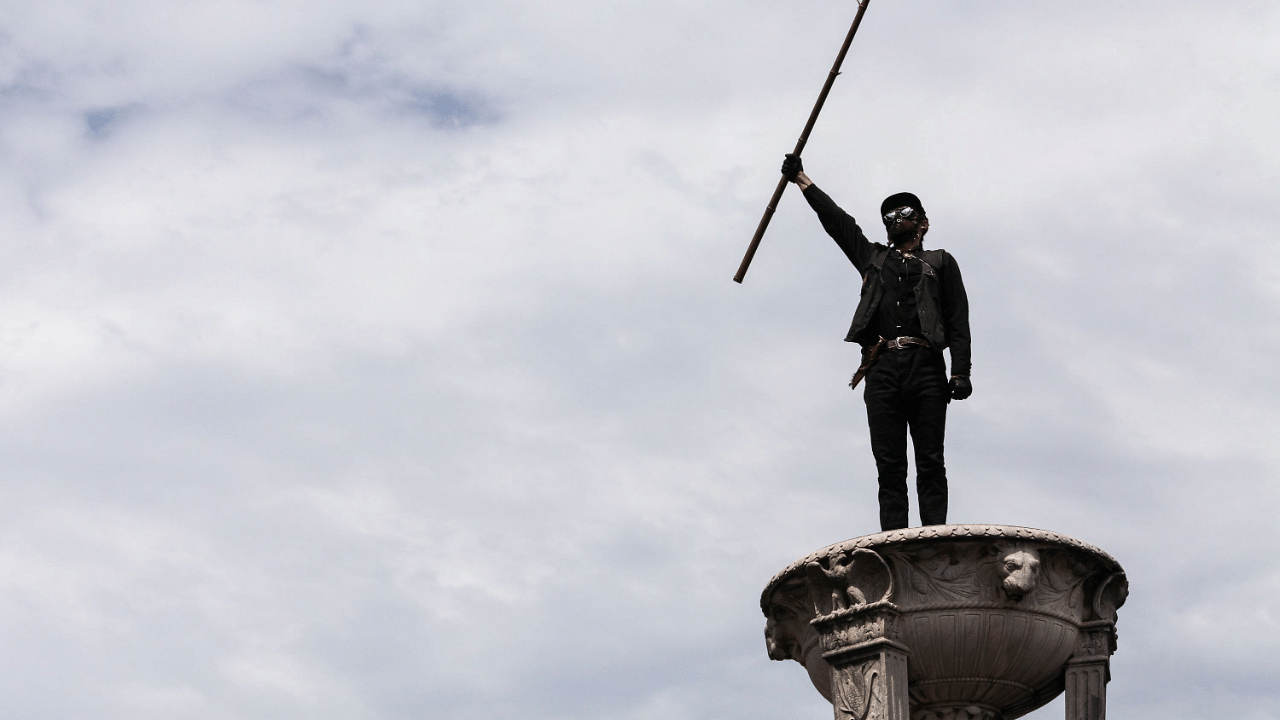
Little is known about the New Yorker described in a 1776 advertisement seeking the return of a runaway slave beyond his given name (James), what he looked like (tall and thin, with bloodshot eyes) and that he was talkative.
James’ owner, Dr Samuel Bard, is less obscure. He was a major figure in New York medical circles at the time, President George Washington’s doctor and a founder of Columbia University’s medical school. He also delivered Alexander Hamilton’s son Philip.
When Columbia opened a dormitory for medical students in Upper Manhattan in 1931, Bard’s name went on it as a tribute to his contributions to the university.
Now — nearly 90 years later, amid a summer of protests against racial injustice and as elite universities and other institutions continue to confront their ties to slavery — his name is about to come off.
On Friday, Lee Bollinger, the university’s president, said in a letter to students and faculty members that the dorm, Bard Hall, would be renamed this fall. A new name has not yet been chosen, and Bollinger’s letter did not offer details about the process for picking one.
“Of course, we cannot indeed should not, erase Samuel Bard’s contributions to the medical school,” Bollinger wrote. “But we must not recall this history without also recognizing the reason for our decision to rename Bard Hall.”
The events that led to the announcement Friday began in 2015, when Columbia students and faculty members, at Bollinger’s direction, began a research project delving into the university’s connections to slavery and how slave-trade profits had helped fund the school.
The push gained momentum this summer after the police killing of George Floyd inspired Raymond Givens, an assistant professor of medicine at Columbia, to start an online petition calling for Bard Hall’s name to be changed and writing to Bollinger and other university officials about the matter.
Givens, who is Black, said that he and others had been frustrated by the university’s failure to drop Bard’s name sooner given that his slave ownership was detailed several years ago.
He also said changing the building’s name was just one step among many that Columbia — where about 5% of the medical students enrolled last fall were Black — needed to take to atone for its past.
“It is the first part of what needs to be a much longer slate of commitments to move the university forward,” Givens said.
The move was the second one in recent weeks involving a Columbia-affiliated school shedding a name over racist or other offensive ideas and actions. Teachers College at Columbia University, which has its own board of trustees, voted in July to remove the name of Edward L. Thorndike, who promoted eugenics and sexist and anti-Semitic ideas, from a building there.
Columbia is the latest top university to begin to take concrete, if modest, steps to address its ties to slavery, whether through ownership of slaves or a reliance on slave-trade revenue.
In 2003, Brown University created a committee dedicated to exploring its relationship with slavery. In 2016, Georgetown University started a project to determine what had become of 272 men, women and children who were sold in the slave trade to keep the university from financial ruin, and what the university might owe their descendants.
A year later, Yale University renamed Calhoun College, which had been named for Vice President John C. Calhoun, who called slavery a “positive good.”
The revisiting of names over race has not been limited to universities’ slave ties. In June, after resisting for several years, Princeton University dropped President Woodrow Wilson’s name from a campus building, citing his racist policies.
Eric Foner, a professor emeritus of history at Columbia who led the research project into the university’s links to slavery, said the ties ran much deeper than the name of Bard Hall, although he said the decision to rename the building was a “wise move.”
“The money from slavery goes way back in Columbia’s history,” he said, adding that the university itself did not own slaves.
Bard’s name figured prominently in the project, Foner said, because of his contributions to the university and because he owned eight slaves, including James, the subject of the runaway-slave ad (Bard offered a $10 reward for his return).
“Samuel Bard was a pretty significant slave owner by New York standards,” Foner said.
Suzanne Goldberg, Columbia’s executive vice president of university life, said that a committee had recommended the renaming of Bard Hall this summer and that the change was part of the university’s “renewed focus” on, and broader commitment to, fighting racism.
Goldberg said Columbia would be reviewing other names and symbols attached to its physical structures and that more changes were possible.
“We are in a time of important renewed attention to our built environment,” she said. “And this is part of that process.”
For Givens, there was a personal aspect to getting Bard Hall’s name changed: His son Lucas attended nursery school in the building.
“Names matter,” Givens said. That, he added, was why “when people protest these police killings, the chant is, ‘Say their names.’”